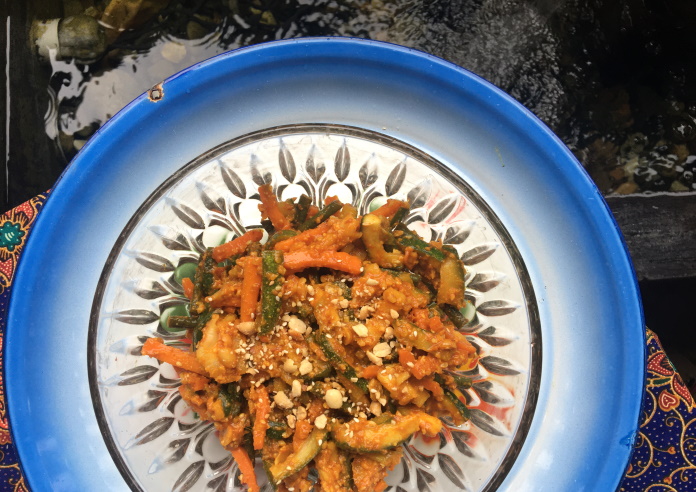
APPETISING is what best describes this popular condiment at the Peranakan* table. Acar is essentially vegetables pickled in an aromatic rempah (spice paste) that promises to perk up your palate and whet your appetite for the meal ahead. An offshoot of the Indonesian dish of the same name, this version packs in spicy, sour, sweet and salty flavours in one mouthful.
Total Time: 3 hours
Difficulty: 2/5
Cost: S$10.00
Yields: 5 small tubs
A: Chilli Paste
50g dried chilli, soaked in boiling water 20 minutes, seeded
125ml water
½ teaspoon salt
125ml oil
B: Rempah (Spice Paste)
5 shallots, peeled
3 cloves garlic, peeled
Thumb-sized ginger, peeled
Thumb-sized fresh turmeric, peeled
2 stalks lemon grass, white portion only, sliced
Thumb-sized shrimp paste (belacan) toasted
Salt to taste
2-3 tablespoons water
C: Assorted Vegetables and Fruit, washed and cut
1-2 cucumbers
2 carrots
150g long beans
50g cabbage
1 quarter pineapple, peeled and eyes removed
3 tablespoons salt
D: Pickling Solution
250ml white vinegar
300g sugar
E: Peanut and Sesame Seed Topping
300g raw peanuts, dry toasted in a pan and coarsely ground
50g roasted sesame seeds
DIRECTIONS:
1.To roast peanuts: Preheat oven to 150°C for at least 10 minutes. Place peanuts on an oven tray and roast for 30 minutes, stirring occasionally to ensure the nuts cook evenly. If using an air fryer, shake the basket a few times occasionally for even cooking. Rub peanuts between a tea towel to dislodge its skin. Placing them on a tray, toss gently in an open space outside the kitchen. Being light, peanut skin will float and fly away.
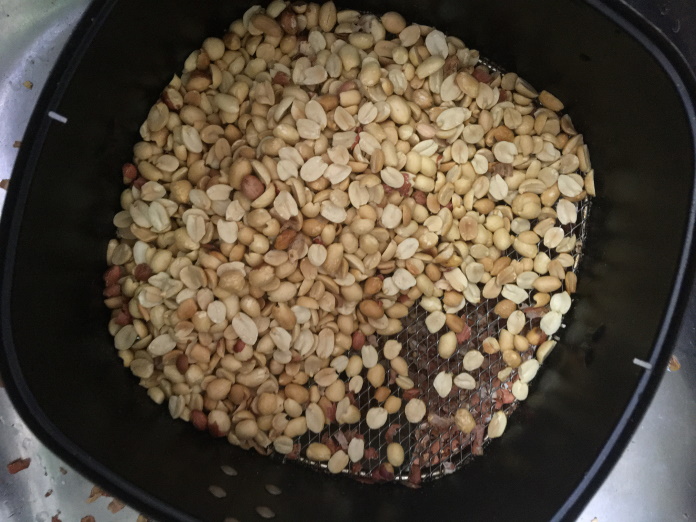
2. Toast sesame seeds in a dry frying pan over low heat. Keep a cautious eye on it, stirring continually as they brown fast and get burned easily. Remove immediately and transfer to a plate. Alternatively, toast seeds in an oven toaster for 2-3 minutes until light brown. Remove immediately as it will continue to roast with residual heat.
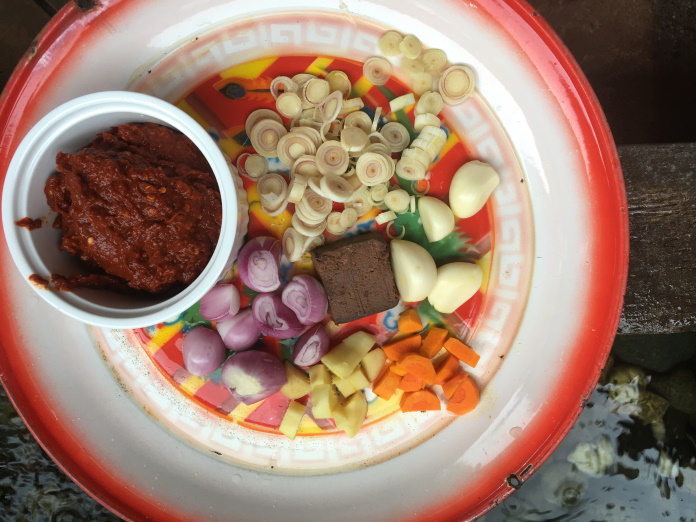
3. To make chilli paste: Place A ingredients except oil in a food processor and pulse until paste is fine, adding 1-2 tablespoons of water if required. This will yield 350g paste. Set aside 150g for this recipe. Store remaining paste in the fridge for other dishes.
4. Place B ingredients in a food processer. Blend into a paste, then add 150g chilli paste from step 3. Set it aside.
5. Heat up oil in a wok or pot over medium low heat. Pour in blended ingredients. Cook, stirring gently until mixture reaches pecah minyak stage — this is when oil in the mixture separates from the paste indicating that it is thoroughly cooked. Leave mixture in wok or pot.
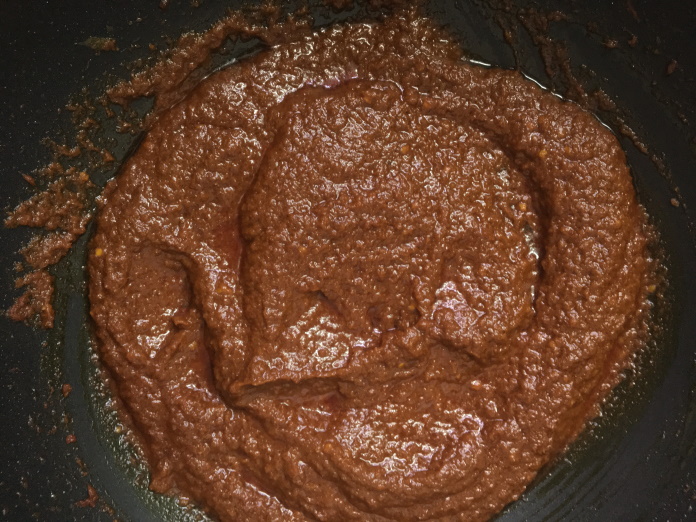
5. Assemble assorted vegetables on a large platter. Bring 1 litre of water to a boil in a medium pot.
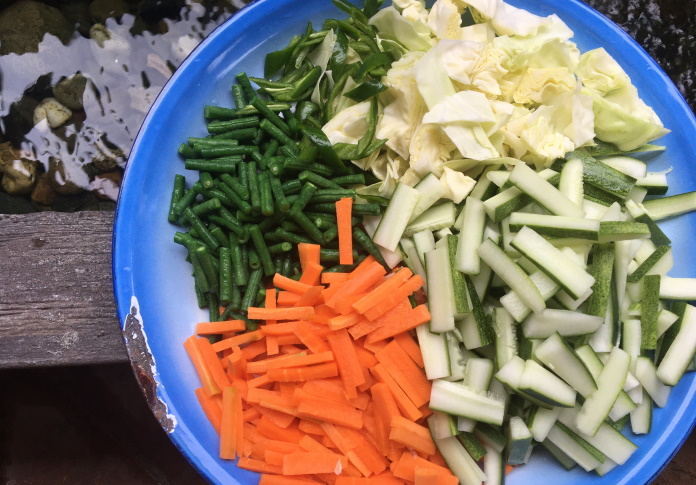
Add in long beans and blanch for 1-2 minutes until they turn dark green. Rinse beans under running tap water and drain.
6. Combine all vegetables except pineapple in a large mixing bowl. Add salt; mix well and allow to sit for 20 minutes. Drain and rinse vegetables under running tap water.
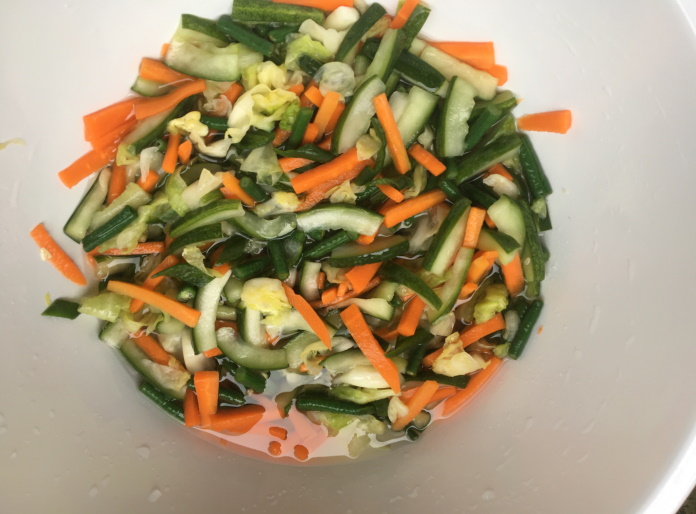
7. Squeeze vegetables dry. Pour in D ingredients. Mix well and set it aside for at least 1 hour. Taste and adjust sugar seasoning if preferred.
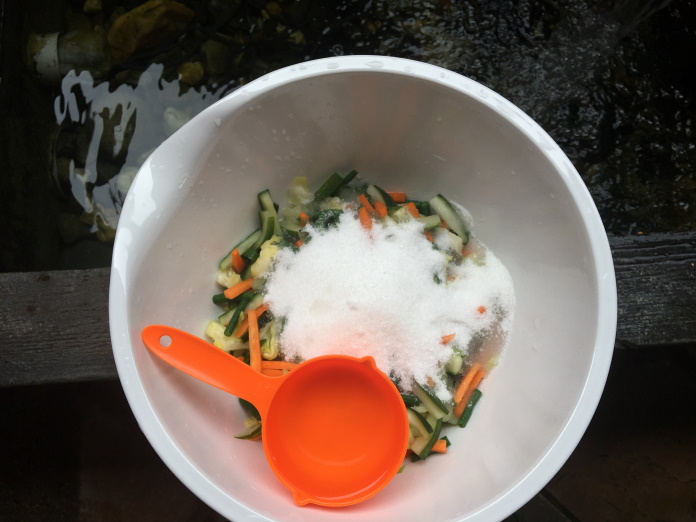
8. Transfer pickled vegetables to another mixing bowl. Set syrup aside. Add in pineapple, cooked rempah and mix well. Sprinkle 3-4 tablespoons of sesame seeds and peanuts on acar. Toss well.
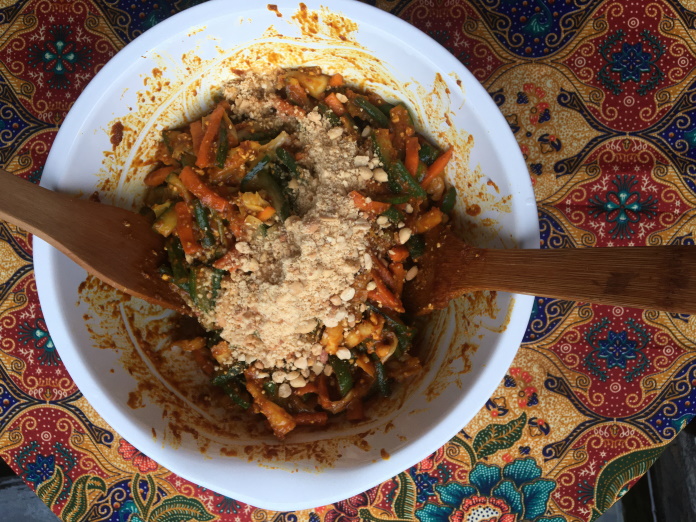
9. Add reserved syrup and adjust seasoning to taste. Sprinkle E mixture over acar. Serve immediately or let it stand at room temperature overnight. Store remaining acar in plastic tubs or glass jars.
*Peranakan or Nyonya cuisine is essentially Chinese cuisine that has been infused with Malay and Indonesian spices. The Peranakans are descendants of 15th-century Chinese traders who intermarried local women of Malay heritage and adopted the Malaysian way of life, culture and cuisine.
TIPS: For A less sour acar, reduce vinegar to 200ml. Refrigerate acar to extend shelf life for up to 1 month. Store peanut topping in a screw-top jar to keep it fresh.
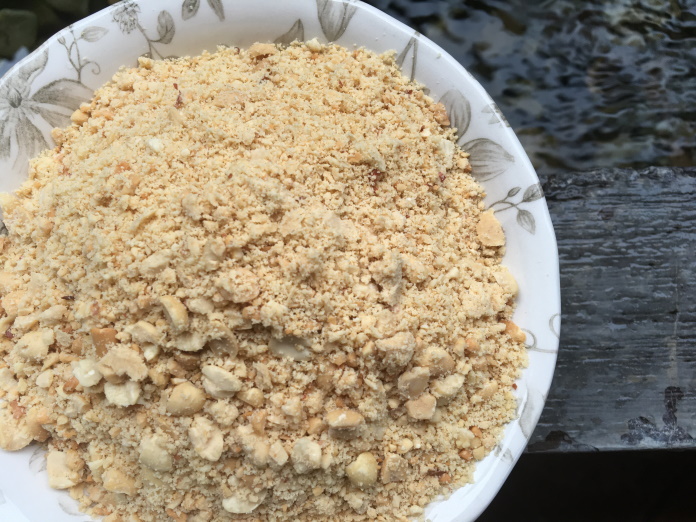
TECHNIQUE: Vegetables with a harder texture like long beans need blanching to soften them — this also arrests the loss of vitamins during fermentation. It is necessary to brine cucumber and carrot to expel water which in turn facilitates fermentation and absorption of the rempah.
Photos: Nellie Bok
About Nellie Bok: This talented self-taught home-cook is often found in her playground churning out delicious curries, whipping up snacks, wrapping Chinese dumplings, baking bread and cakes, stuffing Chinese sausages and making all things delicious in Nell’s Kitchen. In addition, Nellie also conducts cooking classes at a renowned culinary studio in Penang.
Click on STORM-Asia/food for more recipes and reviews of restaurants.
If you have a simple recipe to share, please email it whipitup@storm.sg.
You may like to try these recipes:
Sambal Udang (Prawns in Spicy Paste)



















